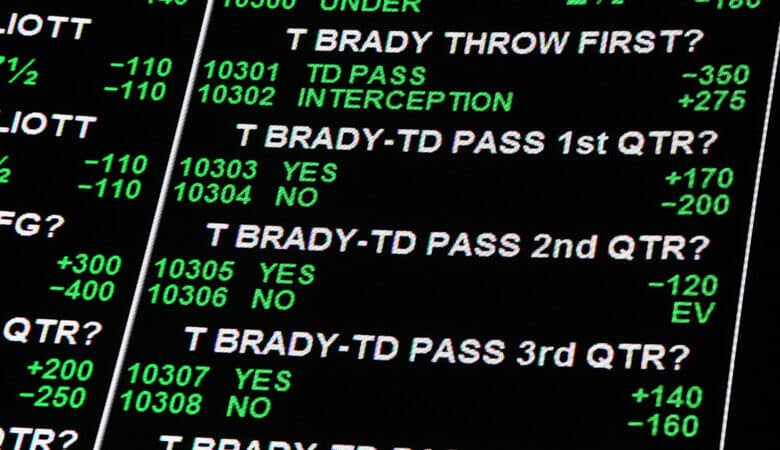Understanding Betting Odds Probability

Betting on sports or other events often involves analyzing and interpreting betting odds. These odds provide valuable information about the likelihood of a particular outcome and can help bettors make informed decisions. In this article, we will explore the concept of betting odds probability and how it can be understood to improve your betting strategy.
Introduction
Betting odds are numerical representations of the probability of an event occurring. They are used by bookmakers to set the prices for different betting options and determine potential payouts. Understanding how to interpret and calculate betting odds is essential for any bettor looking to maximize their chances of winning.
Types of Betting Odds
There are different formats for presenting betting odds, and each has its own conventions. The three most common types of betting odds are decimal odds, fractional odds, and moneyline odds.
Decimal Odds
Decimal odds are popular in Europe and Australia. They represent the total payout a bettor would receive, including their original stake. For example, if the odds are 2.50, a $10 bet would result in a total payout of $25 ($10 x 2.50).
Fractional Odds
Fractional odds are common in the United Kingdom. They are represented as fractions and indicate the potential profit relative to the stake. For example, if the odds are 3/1, a $10 bet would result in a profit of $30 ($10 x 3/1).
Moneyline Odds
Moneyline odds, also known as American odds, are predominantly used in the United States. They are presented as positive or negative numbers and indicate the amount that would be won or lost on a $100 bet. Positive odds represent the potential profit, while negative odds represent the amount that needs to be wagered to win $100.
How Betting Odds Work
Betting odds reflect the bookmaker’s assessment of the probability of an event occurring. They also incorporate a margin, known as the bookmaker’s overground, which ensures the bookmaker makes a profit regardless of the outcome.
Probability and Implied Probability
Every set of odds corresponds to an implied probability, which represents the likelihood of an event occurring. Implied probability can be calculated by dividing 1 by the decimal odds or converting the fractional/moneyline odds into a percentage.
Converting Odds to Probability
Converting odds to probability allows bettors to assess the potential value of a bet. By comparing the implied probability to their own assessment, they can identify favorable or unfavorable odds.
Calculating Potential Payouts
Understanding how to calculate potential payouts is crucial for bettors. By multiplying the stake by the decimal odds, bettors can determine the potential return if their bet is successful. It is important to consider both the potential profit and the return of the initial stake.
iVIP9 is a popular sports betting website that offers a wide range of exciting gambling opportunities. With its user-friendly interface and comprehensive selection of sports events, iVIP9 provides a thrilling and immersive betting experience for sports enthusiasts. Whether you’re a fan of football, basketball, tennis, or any other sport, iVIP9 has you covered. The platform boasts competitive odds, secure transactions, and reliable customer support, ensuring a seamless and enjoyable gambling journey. iVIP9 สมัคร today and unlock a world of thrilling sports betting action.
Understanding Probability in Betting Odds
Interpreting probability in betting odds is essential for making informed decisions. It involves assessing the accuracy of the bookmaker’s assessment and identifying potential value bets.
Probability Interpretation
Betting odds can be interpreted as probabilities. For example, decimal odds of 2.00 imply a 50% chance of winning, while fractional odds of 1/2 indicate a 66.67% probability.
Overround and Bookmaker’s Margin
Bookmakers incorporate a margin into their odds, ensuring they have a profit margin regardless of the outcome. This margin, known as the overround, affects the implied probabilities and can vary between bookmakers and events.
Expected Value and Long-Term Profitability
Expected value is a concept used to assess the potential profitability of a bet over the long run. It involves comparing the implied probability of the odds to the bettor’s own probability assessment. Positive expected value (EV) bets have a higher probability of winning than implied by the odds, offering potential long-term profitability.
Factors Affecting Betting Odds
Several factors can influence the odds offered by bookmakers. Understanding these factors can help bettors make more accurate assessments of the likelihood of an event occurring.
Form and Performance of Teams/Players
The recent form and performance of teams or players can significantly impact the odds. A team or player on a winning streak is likely to have lower odds, reflecting their perceived superiority.
Injuries and Suspensions
Injuries or suspensions to key players can affect the performance and outcome of a game. Bookmakers take these factors into account when setting the odds.
Market Trends and Public Perception
Market trends and public perception can also influence betting odds. Popular teams or players may attract more bets, leading to lower odds, while underdogs may offer higher odds due to less public support.
Evaluating Value in Betting Odds
Identifying value in betting odds is crucial for long-term profitability. It involves finding odds that offer better value than the implied probability, indicating a potential positive expected value bet.
Identifying Discrepancies in Odds
Comparing the odds offered by different bookmakers can help identify discrepancies. If one bookmaker offers higher odds for a particular outcome, it may present a valuable opportunity.
Assessing the Quality of Odds
Evaluating the quality of odds requires considering various factors, such as the bookmaker’s reputation, the margin included in the odds, and the available betting options. Reputable bookmakers with competitive odds generally offer better value.
Using Statistics and Analysis
Utilizing statistical analysis and research can enhance the evaluation of betting odds. Historical data, team/player performance metrics, and situational factors can provide valuable insights into the likelihood of an outcome.
Managing Risk in Betting
Managing risk is essential to maintain a sustainable betting strategy. By implementing effective risk management techniques, bettors can minimize losses and improve their chances of long-term success.
Bankroll Management
Setting a dedicated bankroll and adhering to a staking plan can help prevent excessive losses. It is essential to only bet with funds that you can afford to lose and avoid chasing losses.
Setting Realistic Expectations
Having realistic expectations is crucial in betting. It is unrealistic to expect constant wins, and accepting that losses are part of the process can help maintain a balanced approach.
Avoiding Emotional Decisions
Emotional decisions in betting can lead to irrational choices and increased risk. It is important to remain objective and make decisions based on analysis and probability rather than personal bias or emotions.
Conclusion
Understanding betting odds probability is a fundamental aspect of successful betting. By comprehending the different types of odds, calculating probabilities, evaluating value, and managing risk, bettors can improve their chances of making informed decisions and achieving long-term profitability.
FAQs
- How do I calculate implied probability from betting odds?
- Implied probability can be calculated by dividing 1 by the decimal odds or converting fractional/moneyline odds into percentages.
- What is the best type of odds to use?
- The best type of odds to use depends on personal preference and familiarity. Decimal odds are straightforward, while fractional and moneyline odds are popular in specific regions.
- Can betting odds predict the outcome of a game accurately?
- Betting odds reflect the bookmaker’s assessment of probability, but they are not foolproof predictors. They provide a useful indication but should be supplemented with research and analysis.
- Should I always bet on the favorite with low odds?
- Betting on favorites with low odds may seem like a safe option, but it doesn’t guarantee success. It is crucial to assess the value and consider various factors before making a bet.
- What are some common mistakes to avoid when interpreting betting odds?
- Some common mistakes include neglecting to assess value, relying solely on odds without research, chasing losses, and making emotional decisions. It is essential to approach betting with a balanced and informed mindset.
To provide you with three relevant sources related to this article, here are three trusted platforms you can explore for further information:
- Bettingexpert – Bettingexpert is a popular platform that offers a wealth of information on sports betting strategies, tips, and analyses. You can find expert advice, community discussions, and detailed guides to improve your understanding of betting odds probability.
- Oddschecker – Oddschecker is a comprehensive odds comparison website that allows you to compare betting odds from different bookmakers across various sports. It provides valuable insights into the odds offered by different platforms, helping you make informed betting decisions.
- American Gaming Association – The American Gaming Association is an authoritative organization in the gaming industry. Their website offers insights, research, and reports on various aspects of sports betting, including odds probability and market trends.
By exploring these sources, you can access a wealth of information, expert tips, odds comparisons, and industry insights to deepen your understanding of betting odds probability and enhance your betting strategy.




